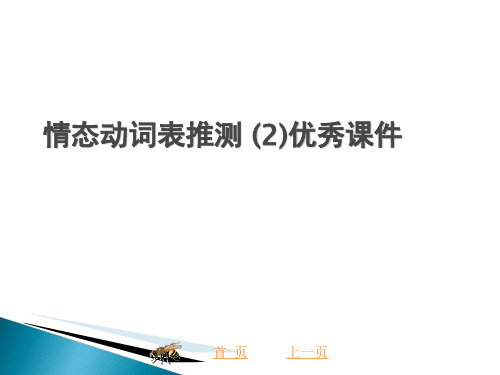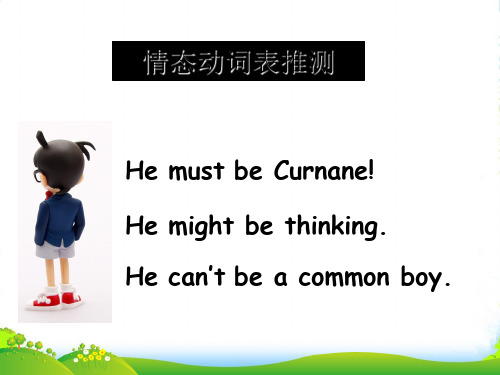情态动词表推测课件59040
合集下载
《情态动词表示推测》PPT课件

会说出这种话的
• The weather in Tibet
could be cold now. 精选PPT
4
may
• may + 动词原形
• may have done (对过去
• may not +动词原形
• (对现在情况的推测), 其肯定式表示“可能”; 否定式表示“可能不”.
• He may be right; I may not be right.
came to see us.
school today.
• --It can’t be Terry. He’s now in London.
can’t have done (对过
•can’t + 动词原形(对现 在情况的推测),表示不
去情况的推测),推测 某事不可能已经发生。
可能.
精选PPT
3
could
情态动词表示推测用法的比较
精选PPT
1
must 只用在肯定陈述句中
• must+状态动原(对现 在情况的推测),表示 满有把握,“一定、想 必已”
• The man could eat all those apples, so he must have a good digestion.
• She must dislike such a man.
精选PPT
11
(may表推测不用于疑问句:)
• 那会是真的吗
情况的推测),对已经 发生的事进行推测,意为 “可能已......”;否定式表 示 “可能还不.......”
• She isn’t here by now; she may have missed her train.
• The weather in Tibet
could be cold now. 精选PPT
4
may
• may + 动词原形
• may have done (对过去
• may not +动词原形
• (对现在情况的推测), 其肯定式表示“可能”; 否定式表示“可能不”.
• He may be right; I may not be right.
came to see us.
school today.
• --It can’t be Terry. He’s now in London.
can’t have done (对过
•can’t + 动词原形(对现 在情况的推测),表示不
去情况的推测),推测 某事不可能已经发生。
可能.
精选PPT
3
could
情态动词表示推测用法的比较
精选PPT
1
must 只用在肯定陈述句中
• must+状态动原(对现 在情况的推测),表示 满有把握,“一定、想 必已”
• The man could eat all those apples, so he must have a good digestion.
• She must dislike such a man.
精选PPT
11
(may表推测不用于疑问句:)
• 那会是真的吗
情况的推测),对已经 发生的事进行推测,意为 “可能已......”;否定式表 示 “可能还不.......”
• She isn’t here by now; she may have missed her train.
《情态动词表推测》课件

根据所给语境,选择合适的情态动词表达对过去事实的 推测。
通过实际语境中的情态动词使用,培养语言逻辑思维能 力。
练习题三:对将来事实的推测
掌握对将来事实的推测 理解情态动词在时间表达中的运用
提高语言表达能力
练习题三:对将来事实的推测
01
练习内容:
02
根据所给语境,选择合适的情态动词表达 对将来事实的推测。
《情态动词表推测》ppt课件
目录
• 情态动词表推测的定义 • 情态动词表推测的用法 • 情态动词表推测的注意事项 • 情态动词表推测的练习与解析 • 总结与回顾
01
情态动词表推测的定义
什么是情态动词
01
情态动词是表示说话人的语气和 态度的动词,它们通常与助动词 结合使用,表达可能性、必要性 、意愿等意义。
02
情态动词表推测的用法
对现在事实的推测
总结词
表示对目前情况的推测
详细描述
情态动词如“may”,“might”,“could”等可以用来表示对目前情况的推 测,通常基于某些证据或迹象,但不确定。例如:“It may be raining today ,based on the dark clouds in the sky.”
以上内容仅供参考,具体内容可以根据实际需求进行修改和 调整。
04
情态动词表推测的练习与解析
练习题一:对现在事实的推测
掌握对现在事实的推 测
提高语言实际运用能 力
理解不同情态动词的 细微差别
练习题一:对现在事实的推测
01
练习内容:
02
03
04
根据所给语境,选择合适的情 态动词表达对现在事实的推测
02
常见的情态动词有can、may、 must、should等。
情态动词表示推测ppt课件

费,遗憾,不好后果)
精选ppt
1
情态动词表示推测的用法
1.对现在(事情)推测: must + v. (肯定)
may/might/could/can+v. (可能)
(情态动词+ 动词原形) can’t + v. (不可能)
2.对过去(事情)推测:(情态动词+ 完成式)
must have done (表肯定性推测) “肯定,准是,” can’t /couldn’t have done (表否定性推测)“不可能”
It must have rained last night,for the
road is wet.(It can’t/couldn’t have rained
last night.)
精选ppt
2
1.It must have rained last night.for the ditch(水道,渠道) is full of water.
精选ppt
7
must表推测的反意疑问句:
反意问句部分永远不带must.
1.She must be a teacher,isn’t she?
2.She must have gone to Shanghai,
hasn’t she?
3.She must have gone to Shanghai
yesterday, didn’t she?
情态动词表示推测的用法
1.对现在(事情)推测 2.对过去(事情)推测
must +v. (肯定) might/could/may/can +v. (可能) can’t+v. (不可能)
1.must have done (表肯定性推测) “肯定,准是,”
情态动词表推测 (2)优秀课件

首页
上一页 下一页
(2)must表推测只能用于肯定句。 如表示“一定不、肯定不”的意思时,应用
can`t, 如询问某种可能时,应用can。 He must know my address. 他肯定知道我的地 址。 (一定) He can`t know my address. 他肯定不知道我的 地址。 (一定不) Can he know my address? 他知道我的地址吗? (询问可能性)
首页
上一页 下一页
情态动词 can, could, may,might,must 表推测的用法:
1. must的用法 (1)表示推测“可能性”时,意思是“一定、 准是”,语气较肯定,较有把握。
He must be American. = It is certain that he is American. 他准是个美国人。
minute ago. 他不可能去了上海,我刚才还看见他。 It`s so late. Where can she have gone? 天晚了,她可 能去哪儿了呢?
首页
上一页 下一页
3. may和might的用法 (1) may, might表示推测“可能性”时,意思 是“可能”、“也许”
He may / might be American. = It is possible
that he is American. 他可能是个美国人。 注:might不表示过去时态,只是语气上比may更 委婉,表示的可能性更小。 (2)may, might表推测时,可以用于否定句,意
思是“可能不、也许不”,但不用于疑问句。
He may / might not be at home. 他也许不在家。
对现在或未来的推测
情态动词表推测课件.ppt

He can`t be at home. = It is impossible that he is at home. 他一定不在家。 (2)can /can`t+ have done,表示对过去发生的动作进 行推测。
He can`t have gone to Shanghai for I saw him a
首页
上一页 下一页
二、 “ought to+have+done”
• 表示过去应该做而实际并没有做,译成 “理应做……”,往往表示遗憾。与 “should+have+done”用法基本一样。
I ought to have gone home last Sunday. 我理 应上星期日回家。
• You ought not to have given him more help. 你不应该帮助他那么多。
注:must表示推测时很少用于将来的情况。一般不用
He must come tomorrow.可用It`s certain / I`m
sure that he will come tomorrow.
首页
上一页 下一页
2. can / could的用法 (1)can表示推测“可能性”时,往往用于否定句或疑 问句。Can`t“一定不”,can在疑问句中意思是“会、可 能”。
minute ago. 他不可能去了上海,我刚才还看见他。 It`s so late. Where can she have gone? 天晚了,她可 能去哪儿了呢?
首页
上一页 下一页
3. may和might的用法 (1) may, might表示推测“可能性”时,意思 是“可能”、“也许”
He may / might be American. = It is possible
He can`t have gone to Shanghai for I saw him a
首页
上一页 下一页
二、 “ought to+have+done”
• 表示过去应该做而实际并没有做,译成 “理应做……”,往往表示遗憾。与 “should+have+done”用法基本一样。
I ought to have gone home last Sunday. 我理 应上星期日回家。
• You ought not to have given him more help. 你不应该帮助他那么多。
注:must表示推测时很少用于将来的情况。一般不用
He must come tomorrow.可用It`s certain / I`m
sure that he will come tomorrow.
首页
上一页 下一页
2. can / could的用法 (1)can表示推测“可能性”时,往往用于否定句或疑 问句。Can`t“一定不”,can在疑问句中意思是“会、可 能”。
minute ago. 他不可能去了上海,我刚才还看见他。 It`s so late. Where can she have gone? 天晚了,她可 能去哪儿了呢?
首页
上一页 下一页
3. may和might的用法 (1) may, might表示推测“可能性”时,意思 是“可能”、“也许”
He may / might be American. = It is possible
关于情态动词表示推测和可能性课件

二、情态动词表推测时的时态问题
❖
以must为例
❖ 1、推测现在的事,结构是:must do/be
❖ eg. He goes to school with a big bag everyday. He must be a student.
❖ 2、推测正在进行的事:must be doing
❖ eg.The light is off now. He must be sleeping.
Food poisoning can cause death. ___食__物_中__毒__可__导__致_死__亡__。____________________
1. It is usually warm in my hometown in March, but it _____ be rather cold sometime.
3. 疑问句中的推测,往往用can或could。
❖Mr. Bush is on time for everything.
How ______ it be that he was late for the opening ceremony?
A. can
B. should
C. may
D. must
翻译:布什先生做什么事都很准时,他怎么 会开幕式迟到呢?
should表推测时,“按 道理该如此”,一般句末 有时间状语,或有语境暗 示。
Shanghai before it
gets dark. A. shall B. should C. must D. need
①It's 8 o'clock now. He
should be in the office now.
情态动词表推测课件

ModalVerbs
单击此处添加正文,文字是您思想的提炼,为了演示发布的良好效果,请言简意赅地阐述您的观点。
20XX
must, can, could, will, would, may, might, should, ought to
01
must>may>might(could) can, could 一般用于否定句和疑问句中can’t一定不,是must的否定句
01
He must be a worker, isn`t he? (现在)他准时个工人,是吗?
02
can / could的用法
can表示推测“可能性”时,往往用于否定句或疑问句。Can`t“一定不”,can在疑问句中意思是“会、可能”。
பைடு நூலகம்
He can`t be at home. = It is impossible that he is at home. 他一定不在家。
1
—————— he finish the task?
2
他可能把任务完成吗?
3
———— he be at home now?
4
他现在能在家吗?
5
Choose the best answers : I thought you______ like something to read. So I have brought you some books. A. ought B. might C. would D. must
02
情态动词 can, could, may,might,must表推测的用法: 情态动词中的can, could, may, might, must都表推测。其中must的可能性最大,can / could次之,may / might最小。具体用法如下: must的用法 表示推测“可能性”时,意思是“一定、准是”,语气较肯定,较有把握。 He must be American. = It is certain that he is American. 他准是个美国人。
单击此处添加正文,文字是您思想的提炼,为了演示发布的良好效果,请言简意赅地阐述您的观点。
20XX
must, can, could, will, would, may, might, should, ought to
01
must>may>might(could) can, could 一般用于否定句和疑问句中can’t一定不,是must的否定句
01
He must be a worker, isn`t he? (现在)他准时个工人,是吗?
02
can / could的用法
can表示推测“可能性”时,往往用于否定句或疑问句。Can`t“一定不”,can在疑问句中意思是“会、可能”。
பைடு நூலகம்
He can`t be at home. = It is impossible that he is at home. 他一定不在家。
1
—————— he finish the task?
2
他可能把任务完成吗?
3
———— he be at home now?
4
他现在能在家吗?
5
Choose the best answers : I thought you______ like something to read. So I have brought you some books. A. ought B. might C. would D. must
02
情态动词 can, could, may,might,must表推测的用法: 情态动词中的can, could, may, might, must都表推测。其中must的可能性最大,can / could次之,may / might最小。具体用法如下: must的用法 表示推测“可能性”时,意思是“一定、准是”,语气较肯定,较有把握。 He must be American. = It is certain that he is American. 他准是个美国人。
情态动词表示推测和可能性课件

一 情态动词表推测; 二 情态动词+have done;
三 解题技巧
Let's read and translate the sentences!
①She couldn't/can't be so stupid to do that. 她不可能去做那种事吧。
②I may be busy from tomorrow on. 从明天起我可能会忙起来。 ③You must be tired after working so long. 你工作这么久以后肯定累了吧。 ④She shouldn't be out in such an early 她不会这么一大早就出去。 morning.
①It's 8 o'clock now. He
should be in the office now. ②Hi, Mum! I'm on the bus. I should be home in about ten minutes.
注:can 有时也用于肯定句中表示推测, 主要用于表示理论上的可能性(即从理论上看是可 能的,但实际未必会发生),或表示“有时”之意。 如:
二、“情态动词+完成式”
must have done can't have done may/might have done can have done
表对过去的猜测
should(ought to) have done shouldn't(oughtn't to havedone could have done need have done needn't have done
一、情态动词表推测
1. 肯定的推测
三 解题技巧
Let's read and translate the sentences!
①She couldn't/can't be so stupid to do that. 她不可能去做那种事吧。
②I may be busy from tomorrow on. 从明天起我可能会忙起来。 ③You must be tired after working so long. 你工作这么久以后肯定累了吧。 ④She shouldn't be out in such an early 她不会这么一大早就出去。 morning.
①It's 8 o'clock now. He
should be in the office now. ②Hi, Mum! I'm on the bus. I should be home in about ten minutes.
注:can 有时也用于肯定句中表示推测, 主要用于表示理论上的可能性(即从理论上看是可 能的,但实际未必会发生),或表示“有时”之意。 如:
二、“情态动词+完成式”
must have done can't have done may/might have done can have done
表对过去的猜测
should(ought to) have done shouldn't(oughtn't to havedone could have done need have done needn't have done
一、情态动词表推测
1. 肯定的推测
8.情态动词表推测课件

The light is on, so my sister __m_a_y_/_m__ig_h_t_ be at home.
常用于表推测的情态动词
must(一定)
最强
will(很有可能)
would(很有可能)
ought to(应该,很有可能) should(应该,很有可能)
肯定推测
can(可能) could(可能)
对过去推测的几组用法
1. must have done 表对已经发生的事情的推测,意为“一定,想 必”,在句子中表示的是一种肯定的推测。这 种结构一般只用于肯定句。
He didn’t hear the phone. He must have been asleep. They can’t have gone out, because the light is still on.
--Yes, it ___m_u_s_t___ be his. This is his name on the back. 5. You’d better take an umbrella. It m__ay_/_m_i_g_h_t/_c_o_u_ld
rain this afternoon.
6. It’s the library! So you ___m_u_st__ know shouting is not allowed here. 7. --Have you decided where to spend your summer holiday?
否定形式:can’t (couldn’t) have done “不可能,肯定不会”
对过去推测的几组用法
2. can/ could have done
表对过去的时间里可能发生的事情的推测, 一般只用于否定句和疑问句。
常用于表推测的情态动词
must(一定)
最强
will(很有可能)
would(很有可能)
ought to(应该,很有可能) should(应该,很有可能)
肯定推测
can(可能) could(可能)
对过去推测的几组用法
1. must have done 表对已经发生的事情的推测,意为“一定,想 必”,在句子中表示的是一种肯定的推测。这 种结构一般只用于肯定句。
He didn’t hear the phone. He must have been asleep. They can’t have gone out, because the light is still on.
--Yes, it ___m_u_s_t___ be his. This is his name on the back. 5. You’d better take an umbrella. It m__ay_/_m_i_g_h_t/_c_o_u_ld
rain this afternoon.
6. It’s the library! So you ___m_u_st__ know shouting is not allowed here. 7. --Have you decided where to spend your summer holiday?
否定形式:can’t (couldn’t) have done “不可能,肯定不会”
对过去推测的几组用法
2. can/ could have done
表对过去的时间里可能发生的事情的推测, 一般只用于否定句和疑问句。
- 1、下载文档前请自行甄别文档内容的完整性,平台不提供额外的编辑、内容补充、找答案等附加服务。
- 2、"仅部分预览"的文档,不可在线预览部分如存在完整性等问题,可反馈申请退款(可完整预览的文档不适用该条件!)。
- 3、如文档侵犯您的权益,请联系客服反馈,我们会尽快为您处理(人工客服工作时间:9:00-18:30)。
首页
上一页 下一页
(4)在反意疑问句中,当附属部分含有 表示推测意义的must时,疑问部分的助 动词应与must后面的动词在非推测情况 下的用法保持一致。
He must be a worker, isn`t he? (现 在)他准时个工人,是吗?
首页
上一页 下一页
2. can / could的用法
Can he know my address? 他知道我的地址吗? (询问可能性)
首页
上一页 下一页
(3)must表示推测时,可以推测现在/正在 发生的动作 He must have a car now. (现在)他一定 有辆小汽车。
He must be doing his exercises in the classroom.(正在进行)他一定在教室里做 练习。
Excuse me, could you tell me the way to the bus station? Could you help me?
首页
上一页 下一页
3. may和might的用法 (1) may, might表示推测“可能性”时,意思是“可 能”、“也许”
He may / might be American. = It is possible that he
(1)can表示推测“可能性”时,往往 用于否定句或疑问句。Can`t“一定不”, can在疑问句中意思是“会、可能”。
He can`t be at home. = It is impossible that he is at home. 他一定 不在家。
首页
上一页 下一页
(3)could 还可以用于表示客气、委 婉、礼貌的请求语气。
情态动词中的can, could, may, might, must都表推测。其 中must的可能性最大,can / could次之,may / might最小。 具体用法如下: 1. must的用法 (1)表示推测“可能性”时,意思是“一定、准是”, 语气较肯定,较有把握。
He must be American. = It is certain that he is American. 他准是个美国人。
still single.
A. can’t
B. mustn’t
C. may not
D. ought ห้องสมุดไป่ตู้o
• 3. Peter _____come with us tonight, but he isn’t very sure. A. must B. may C. can D. will
首页
上一页 下一页
首页
上一页 下一页
must, can, could, will, would, may, might, should, ought to
must>may>might(could) can, could 一般用于否定句和疑问句
中can’t一定不,是must的否定句
情态动词 can, could, may,might,must 表推测的用法:
5. –Look, someone is coming.
Guess__________ .
--Jack. He’s always on time.
A. who can it be
B. who he may
C. who he can be
D. who it can be
首页
上一页 下一页
6. David, you _____play with the valuable
4. –What____ it be?
--It______ be a mail box, for it is moving.
It______ be a car.
A. can; can’t; must B. can; can; must
C. can; mustn’t; must D. must; mustn’t; can
is American. 他可能是个美国人。 注:might不表示过去时态,只是语气上比may更委婉, 表示的可能性更小。 (2)may, might表推测时,可以用于否定句,意思是
“可能不、也许不”,但不用于疑问句。
He may / might not be at home. 他也许不在家。
首页
上一页 下一页
• 3.疑问句中用can/could (能……?)。 (1)—————— he finish the task? 他可能把任务完成吗?
(2)———— he be at home now? 他现在能在家吗?
Choose the best answers :
1. I thought you______ like
情态动词表推测的三种句 式
1.在肯定句中一般用must (一定),may (可能),might / could(也许,或 许)。
• It ——— be Ning’s. It has her name on it 。
• The guitar ———— belong to Alice.
She plays the guitar.
• 2.否定句中用can’t / couldn’t(不可能), may not/might not(可能不)。
• (1)It ______ be the headmaster. He has gone to America
• (2)He ————know the scientist. 他也许不认识那位科学家。
首页
上一页 下一页
(2)must表推测只能用于肯定句。 如表示“一定不、肯定不”的意思时,改为否定用can`t, 如询问某种可能时,应用can。 He must know my address. 他肯定知道我的地址。 (一定)
He can`t know my address. 他肯定不知道我的地址。 (一定不)
something to read. So I have brought
you some books.
A. ought
B. might
C. would
D. must
首页
上一页 下一页
• 2. –That man must be Sarah’s husband.
--No, he_____ be her husband. She is
